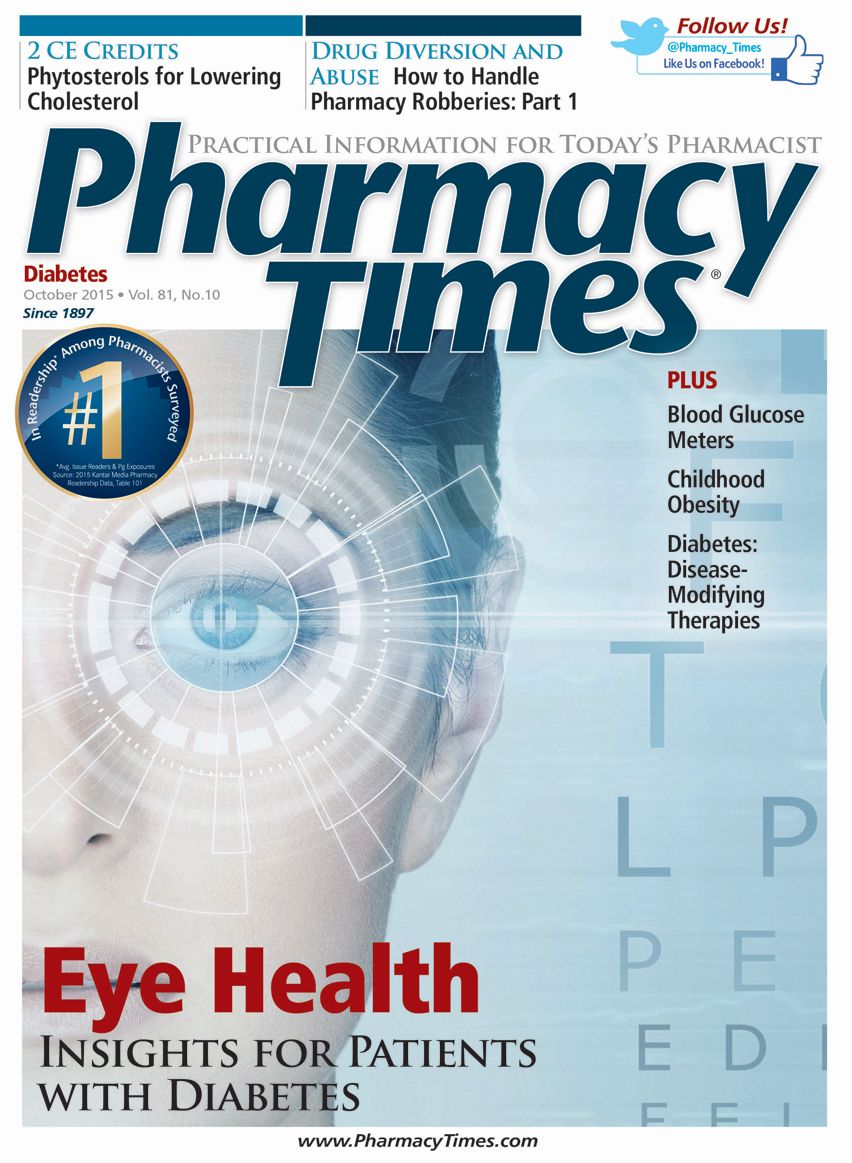Publication
Article
Pharmacy Times
Self-Care for Patients with Diabetes
Which OTC products should these pharmacists recommend?
CASE 1: VASCULAR STOCKINGS FOR DIABETIC FOOT CARE
A 55-year-old man approaches the pharmacy counter with a question for the pharmacist. He has a medical history significant for diabetes, hypertension, dyslipidemia, and chronic venous insufficiency in his lower extremities. His physician recently recommended that he use graduated compression stockings to help improve the circulation to his lower extremities; however, he is wondering if he can just wrap his legs tightly with bandages he has at home to get the same effect as wearing stockings. What information should the pharmacist give this gentleman regarding the use of vascular stockings for his condition?
ANSWER
Standard treatment for chronic venous insufficiency involves use of graduated compression stockings to provide 30 to 40 mm Hg or 40 to 50 mm Hg compression at the ankle, with gradually reduced compression applied up the leg.1 In the case of this patient, however, the recommendation to use compression stockings is complicated by his comorbid diabetes; recommending a product with a high degree of compression could result in impaired circulation and foot injury, particularly if he has some degree of neuropathy. In clinical trials, mild compression (18-25 mm Hg), when used in patients who have diabetes to treat their lower extremity edema, has been shown to improve symptoms without adversely affecting vascularity.2 In this case, it is prudent to counsel this patient to absolutely avoid wrapping his extremities with an elastic bandage from home, which could form a tourniquet and worsen venous insufficiency. Instead, recommend he purchase diabetic compression stockings that provide mild compression, as described, but also are moisture-wicking, breathable, and seamless to avoid the possibility of causing foot injury. It is prudent to remind him of the importance of good foot hygiene, including checking his feet every day, wearing socks and shoes at all times, and carefully trimming toenails, to prevent ulceration and infection.3
CASE 2: VITAMINS FOR PREVENTING DIABETIC RETINOPATHY
A 62-year-old woman comes to the pharmacy asking about the use of vitamins to prevent diabetic eye problems. She was recently given a diagnosis of type 2 diabetes and has been attempting to control her blood sugar level with a combination of dietary modification, exercise, and weight loss. She has participated in a diabetes education program in which she has learned about complications associated with an uncontrolled blood sugar level, including heart and kidney disease, as well as retinopathy. She has been instructed to take low-dose aspirin once daily and has just started therapy with lisinopril 10 mg and atorvastatin 40 mg once daily, but she is concerned she is not doing anything to prevent the diabetic eye problems she learned about. She asks if there is an OTC vitamin the pharmacist can recommend to improve her eye health. What information should the pharmacist provide?
ANSWER
Several nutrients, including lutein, zeaxanthin, betacarotene, omega-3 fatty acids, and zinc, as well as other antioxidants, are recognized as having an effect on eye health and vision. However, clinical trials on the use of supplements to prevent chronic diseases, including diabetic eye disease, are often limited in terms of numbers of patients, duration of treatment, and multivitamin formula. Nevertheless, a recent 6-month, randomized, controlled trial of a particular multivitamin formulation in adult patients with diabetes demonstrated clinically meaningful improvements in visual function.4 Based on the information the patient provided, she will likely experience no harm from supplementation with a multivitamin intended to improve eye health. However, it is reasonable to reiterate that taking a vitamin alone is unlikely to prevent diabetic eye disease. Remind this patient that the best measures she can take for reducing her risk of diabetic retinopathy include controlling her blood sugar level and blood pressure and having a dilated eye examination by an ophthalmologist or optometrist at least once per year.5 If she notices any changes in her vision (eg, floaters, blurry or double vision, eye pain), she should seek evaluation by an ophthalmologist immediately.5
CASE 3: MEAL REPLACEMENT FOR PATIENTS WITH DIABETES
A 45-year-old woman approaches the pharmacy looking for diabetic meal replacement shakes. She has type 2 diabetes and, due to a busy workday and career that requires much travel, has had difficulty meeting her target blood glucose values. She is currently taking metformin 1000 mg twice daily, enalapril 5 mg twice daily, and atorvastatin 20 mg once a day at bedtime. Her last glycated hemoglobin reading was 8%, and it was recommended she see a nutritionist to better control her diet. She was encouraged to drink a diabetic “shake” to replace missed meals or snacks; however, she is lactose intolerant and is concerned these supplements will not agree with her. Is there a product the pharmacist can recommend to this patient, given her comorbidities?
ANSWER
There are myriad diabetic meal replacement and snack options, including bars, crisps, and shakes, for individuals having difficulty making meal selections or wanting to control food portions in order to lose weight. These products are often touted as promoting more stable blood glucose levels, and can be used as snacks or meal supplements to minimize swings in glucose values. Most products provide macronutrients (carbohydrate, fat, and protein), and some formulations also include vitamins and minerals.6 In addition to coming in multiple flavors, these products have numerous formulations for individuals with specific dietary restrictions, such as glutenor lactose-free. Due to this patient’s lactose intolerance, instruct her to scrutinize the package labeling and select a formulation that is lactose-free.
CASE 4: HERBAL SUPPLEMENTS FOR DIABETES PREVENTION
A 35-year-old woman wants to speak to the pharmacist about magnesium supplementation to prevent diabetes. During her last pregnancy, she was given a diagnosis of gestational diabetes, which she was able to control with diet modification and exercise. At her postpartum follow-up, she discussed with her obstetrician/ gynecologist her risk of developing diabetes later in life and understands that having had gestational diabetes puts her at an increased risk for this condition. She has no other medical comorbidities and is currently breast-feeding and taking a prenatal vitamin once daily. What should the pharmacist recommend regarding the use of magnesium for diabetes prevention?
ANSWER
Magnesium is the second most abundant cation in the body and, as a supplement, has garnered some attention for use in prevention and treatment of diabetes. The results of 2 meta-analyses of cohort trials investigating the effects of dietary magnesium intake on the risk of diabetes have suggested that individuals with increased magnesium intake (>100 mg/day) have a lower incidence of developing type 2 diabetes.7,8 These analyses are limited, however, in that data from women who have had gestational diabetes are not independently evaluated from the larger patient populations enrolled in the trials that serve as the basis for the analyses. If this patient is contemplating magnesium supplementation based on this evidence, remind her to evaluate the product label of the prenatal vitamin she is currently taking before she takes additional magnesium. Adverse effects associated with magnesium supplementation commonly include gastrointestinal complaints—particularly nausea, vomiting, and abdominal pain—in addition to constipation and diarrhea.9 Finally, remind her that the best strategies for preventing diabetes after having had gestational diabetes are to lose weight (if she is over her ideal body weight), exercise routinely, breast-feed, and partake in annual health screenings to monitor her blood sugar level.10
Got an interesting question regarding OTC medications? Contact the authors at [email protected] and share the details. Your case could be featured in an upcoming column!
Dr. Bridgeman is a clinical associate professor at the Ernest Mario School of Pharmacy, Rutgers University, and an internal medicine clinical pharmacist at Robert Wood Johnson University Hospital in New Brunswick, New Jersey. Dr. Mansukhani is a clinical assistant professor at the Ernest Mario School of Pharmacy, Rutgers University, and a transitions-of-care clinical pharmacist at Morristown Medical Center in Morristown, New Jersey.
References
- Vanscheidt W, Ukat A, Partsch H. Dose-response of compression therapy for chronic venous edema—higher pressures are associated with greater volume reduction: two randomized clinical studies. J Vasc Surg. 2009;49:395-402, 402.e1.
- Wu SC, Crews RT, Najafi B, et al. Safety and efficacy of mild compression (18-25 mmHg) therapy in patients with diabetes and lower extremity edema. J Diabetes Sci Technol. 2012;6:641-647.
- American Diabetes Association. Foot care. www.diabetes.org/living-with-diabetes/complications/foot-complications/foot-care.html. Accessed September 17, 2015.
- American Diabetes Association. Eye care. www.diabetes.org/living-with-diabetes/complications/eye-complications/eye-care.htmlAccessed September 17, 2015.
- Chous AP, Richer SP, Gerson JD, Kowluru RA. The diabetes visual function supplement study (DiVFuSS). Br J Ophthalmol. 2015;0:1-8. doi:10.1136/bjophthalmol-2014-306534.
- American Diabetes Association. Nutrition recommendation and interventions for diabetes. Diabetes Care. 2008;31:S61-S78.
- Larsson SC, Wolk A. Magnesium intake and risk of type-2 diabetes: a meta-analysis. J Intern Med. 2007:262:208-214.
- Dong JY, Xun P, He K, Qin LQ. Magnesium intake and risk of type 2 diabetes: meta-analysis of prospective cohort studies. Diabetes Care. 2011;34:2116-2122.
- Magnesium monograph. In: Natural Medicines Comprehensive Database [Internet]. Stockton (CA): Therapeutic Research Faculty; c1995-2015 [cited 2015 Sept 17]. www.therapeuticresearch.net. Accessed September 17, 2015.
- American Diabetes Association. Gestational diabetes. www.diabetes.org/are-you-at-risk/lower-your-risk/gdm.html. Accessed September 17, 2015.

Newsletter
Stay informed on drug updates, treatment guidelines, and pharmacy practice trends—subscribe to Pharmacy Times for weekly clinical insights.






